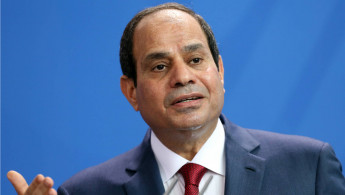Sisi defends austerity measures in Egypt
Egypt's President Abdel Fatah al-Sisi defended the latest austerity measures introduced in the country.
The government recently said it would raise the price of electricity and tap water as part of a wider initiative to qualify for a three-year $12 billion IMF loan, which Egypt secured in 2016. A new round of subsidy cuts is also expected soon.
Sisi said late Tuesday in televised remarks that the country spends 330 billion Egyptian pounds ($18.6 billion) annually in fuel, food and electricity subsidies. Each family receives about $60 per year, he said.
His comments came hours after the government announced it would slash electricity subsidies, pushing up the average cost by 26 per cent.
The cost of electricity for factories would rise by 41.8 per cent and for households 20.9 per cent, according to Electricity Minister Mohamed Shaker.
"All challenges and difficulties could be easy if we endure them. ... We have to pay the price together," Sisi said, urging patience.
Twitter Post
|
Egypt's economy is still reeling after the 2011 uprising ushered in political and economic instability. The measures, which none of his predecssors dared implement, are biting for poor and middle class Egyptians.
Since the military seized power and toppled the Islamist and democratically elected Mohamed Morsi in 2013, authorities have launched a sweeping crackdown on dissent.
Security officials have linked the latest wave of arrests to a new round of fuel subsidy cuts. The authorities are concerned activists agitate people to protest against the government decisions to slash subsidies, like the rare protest against a decision to hike fares on Cairo's subway system weeks ago, the officials said.
"All of us know that there will be a wave of high prices as part of the economic reform program," one official said. "They (arrested activists) used to agitate people mainly through social media when the government takes such decisions".
Sisi began his second four-year term in office after receiving more than 97 per cent of the vote in what was widely considered neither a free nor fair election. Authorities pushed out or arrested at least five major contenders in the lead up to the vote.
Follow us on Twitter: @The_NewArab





 Follow the Middle East's top stories in English at The New Arab on Google News
Follow the Middle East's top stories in English at The New Arab on Google News
![Both Hamas and the Palestinian Authority welcomed the ICC arrest warrants [Getty]](/sites/default/files/styles/image_330x185/public/2024-11/GettyImages-2178351173.jpg?h=199d8c1f&itok=TV858iVg)

